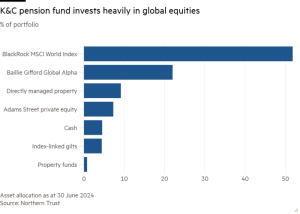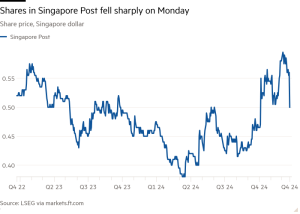Birmingham equal pay deal raises doubt over council’s bankruptcy
Unlock the Editor’s Digest for free
Roula Khalaf, Editor of the FT, selects her favourite stories in this weekly newsletter.
Birmingham is expected to pay about £250mn to settle a historic equal pay claim, a figure that calls into question the bankruptcy process that forced the city council to make deep cuts to services and agree £750mn in asset sales.
The local authority said it was seeking formal agreement on Tuesday from its cabinet committee for a deal with the GMB and Unison unions to resolve the long-standing dispute.
The claims go back to a 2017 deal giving striking male refuse collectors favourable terms that were discriminatory to women in equivalent roles.
The council’s Labour leader John Cotton said the deal marked “the start of a new era of productive and progressive industrial relations built on trust and mutual respect”.
Rhea Wolfson, GMB head of industrial relations, hailed the “good faith” in which the most recent negotiations with the council have taken place.
She said that for some of the 6,000 women who stand to gain from the settlement, many of whom were on the “acute end of the cost of living crisis”, it would make the difference between one or two hot meals a day.
“This shows that it [equal pay] does not have be as calamitous as it has been in Birmingham, that there was no need for it to implode the city,” she said.
People familiar with the negotiations said there was still significant work to be done establishing pension liabilities and other details on a case-by-case basis before a final figure would be known, but that it would probably be about £250mn.
Based on a higher projection of the payout estimated by the council in September 2023 at between £650mn and £760mn, and used by auditors Grant Thornton in statutory recommendations, Birmingham issued a Section 114 notice declaring effective bankruptcy in September 2023.
This led the previous Conservative government to send in external commissioners to oversee the finances of the council, which has since agreed to carry out some of the most far-reaching cuts in local government history and asset sales worth £750mn.
The cost of borrowing for the council has risen substantially as a result, to about £260mn in 2024-25.
Underpinning the affair was the botched launch of a new Oracle software operating system that caused the council in 2023 to lose sight of the numbers on everything from council tax and business rate collection to salaries of staff.
The council has spent about £100mn more on launching the system than originally budgeted for, contributing to financial pressures.
Critics said the council might have avoided Section 114 proceedings and government intervention had the equal pay claim estimates not been blown out of proportion.
James Brackley from the audit reform lab at Sheffield university, a group of academics that investigates apparent auditing failures, said Birmingham could, like 19 other councils under financial strain last year, have instead got government permission for a capitalisation direction.
This would have allowed the council, the largest in Europe in terms of the number of people it serves and services it provides, to use capital resources to cover recurrent expenditure.
People familiar with the matter said it was not immediately clear whether the exceptional measures imposed on Birmingham, and commissioners sent in to oversee its finances, could soon be withdrawn.
The payout on equal pay meanwhile is not expected until some time next year.
#Birmingham #equal #pay #deal #raises #doubt #councils #bankruptcy






